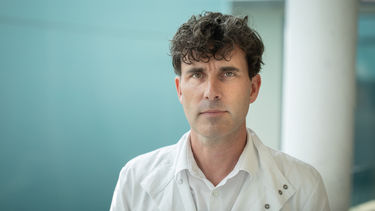SITraN: A powerhouse of research and hope
¬È∂π÷±≤•app‚Äôs world-renowned Sheffield Institute for Translational Neuroscience (SITraN) is the first centre in the UK to develop a drug that is proven to extend the life of patients with a rare genetic type of MND linked to the SOD1 gene. This new drug not only slows disease progression but also improves patients' muscle strength.
Over the past decade, SITraN has led over 250 clinical trials and advanced research that have become new treatments for MND, Parkinson’s, and other genetic diseases.
Telling somebody they have MND is the hardest thing I have to do. It’s devastating for them. They want to hear we’ve got treatments that will stop the disease and give them back what they’ve lost. But we haven’t.”
Chris McDermott
Professor of Translational Neurology
MND targets the nerves in the brain and spinal cord that control muscle movement. Its symptoms are wide-ranging and include the loss of the ability to walk, speak, eat, and even breathe. These symptoms progressively worsen, profoundly impacting every aspect of life for both patients and their families.
- Up to 5,000 adults are living with MND in the UK
- 1 in 300 people will develop MND
- 75% of people will die within 5 years of diagnosis
With continued innovation and support, SITraN’s next major breakthrough could be the cure for MND. But there’s still much to be done, and we need your help to make it happen.
Tackling MND together
SITraN harnesses the expertise of the world’s brightest minds, driving breakthroughs in treatments and cures that are already transforming countless lives. Hear from alumni and donors who believe in this urgent mission and are already committed to make it happen. Would you like to join them?
“Keep striving to give hope to so many people”
Anonymous donor
“I lost my truly remarkable husband to this dreadful condition in 2022 at the age of just 67. My life will never be the same and I want to support the work of SITraN in finding a cure for a condition which impacts so significantly on both patients and families."
Gill Pollard
Sheffield alumna
“I work as a part-time volunteer in a local hospice. MND is such a devastating illness the sooner a treatment and cure, the better.”
Anonymous donor
“My father died of MND, which raised my interest in a cure. For such an active and independent man, MND might have been especially difficult. However, he coped with his progressive debility extraordinarily well. People would ask, ‘How are you?’ His response, ‘Dying cheerfully.’ They then said, ‘Oh, you mustn’t say that,’ to which he replied, ‘Would you rather I was dying miserably?”
John Malcomson
Sheffield alumnus
“I am sure, one day, the research will result in a life-changing breakthrough for many future MND sufferers. Having watched two friends, and their struggles against all the side effects of MND, I am happy to donate to help further your work. Sheffield continues to be a leader in this field of medicine.”
Sylvia Cole
Sheffield alumna
“We fully support the researchers working on such important medical issues.”
Anonymous donor
“I would like to send a heartfelt ‘thank you’ to everyone who is working towards finding a cure for Motor Neuron Disease. My darling husband Paul died from MND in 2021, only three months after he was diagnosed. It is such an incredibly cruel and devastating disease. Although it was too late for him, he would have been delighted if through your amazing work, you could prevent other people and their families from experiencing such heartbreak.”
Vanessa Tanfield
Sheffield alumna

